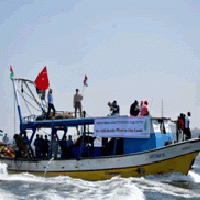![]()
Sat, July 09, 2011 | By Rob Harris
Legal issues and the Flotilla: Can Greece legitimately prevent the flotilla sailing to Gaza?
This is the first of a two part article on legal issues concerning the Gaza Flotilla.
There has been a lot of outrage in the last week over Greece’s decision not to allow several flotilla ships sail from its docks to Gaza and they took over the “Tahrir” after it departed. Greece also prevented another flotilla ship, the “Audacity of Hope”, from sailing without permission and arrested the captain. The stated aim was to protect human life after the violence of last year’s flotilla. They offered to transport the aid to Gaza. The offer was rebuffed even though flotilla organisers keep claiming it is critical to the people of Gaza.
Flotilla organisers have declared there is no legal basis for Greece preventing the flotilla from sailing. It is based on the opinion of one Richard Falk, a man notorious for his explicit support of Palestinian terrorism as “resistance”, and who most recently posted an anti-Semitic cartoon on his blog. He asserted that Greece cannot interfere with innocent passage through its territorial waters. Yet the Tahrir and other flotilla ships didn’t merely sail through Greece’s territorial waters. They docked in Greece which makes them further subject within limited parameters to rulings by the Greek authorities.
Even more critically, it is very doubtful as to whether or not the flotilla mission constitutes “innocent passage”. It should be noted that the author is not an expert on maritime law but a careful look at the relevant texts and a look at the understanding a few experts should be sufficient. Here is one definition of innocent passage
A term of international law referring to a ship or aircraft’s right to enter and pass through another’s territory so long as it is not prejudicial to the peace, good order or security of the other state.
The “Convention on the Law of the Sea” or the “United Nations Convention on the Law of the Sea” (UNCLOS) is the de jure international framework which defines the rights and responsibilities of nations in their use of seas and oceans throughout the world, which evolved over decades at the UN. Section one of Article 19, entitled “Meaning of innocent passage” states:
Passage is innocent so long as it is not prejudicial to the peace, good order or security of the coastal State. Such passage shall take place in conformity with this Convention and with other rules of international law.
Thus it is clear that innocent passage requires acceptability within the framework of international law. This would include missions where there is a clearly expressed intent to break blockades, if they are seen as having legality. Paragraph 67 of the San Remo Manual on “International Law Applicable to Armed Conflicts at Sea” (1994) states:
Merchant vessels flying the flag of neutral States may not be attacked unless they: (a) are believed on reasonable grounds to be carrying contraband or breaching a blockade, and after prior warning they intentionally and clearly refuse to stop, or intentionally and clearly resist visit, search or capture; (b) engage in belligerent acts on behalf of the enemy; (c) act as auxiliaries to the enemy s armed forces; (d) are incorporated into or assist the enemy s intelligence system; (e) sail under convoy of enemy warships.
The UN Palmer report on last year’s flotilla, has been delayed due to disagreements between Turkey and Israel. However, the findings have been leaked. The report asserts that the IDF used excess force in the raid but it affirms that the Gaza blockade is legitimate. It accuses Turkey of ties with the IHH group, which initiated the violence on the flotilla. Whilst its hard to understand how Israel used excessive force as deaths and serious violence only occurred on one ship associated with the IHH, an NGO associated with Islamicist terrorist groups in several countries, it nonetheless validates Israel’s stance with regard to the legality of the blockade.
Unfortunately the mainstream media has largely ignored these revelations or distorted the story, as in the case of AFP (Agence France-Presse) where there is no proper mention of the finding on the legality of the blockade.
Therefore, based on a reading of the relevant texts, it would seem that the flotilla cannot be said to be engaged in innocent passage, even though it poses no threat to the coastal state, in this instance Greece.
Note: A follow-up piece will be published dealing with further points that often arise in the argument over the legitimacy of the blockade, called Further points in the argument over the blockade.



 RSS
RSS











Legal issues and the Flotilla: Can #Greece legitimately prevent the #flotilla sailing to #Gaza? | #Israel http://bit.ly/nyu32G
Legal issues and the Flotilla: Can #Greece legitimately prevent the #flotilla sailing to #Gaza? | #Israel http://bit.ly/nyu32G